Unremovable Clasp Requires 2 Hands to Open

Hard to Remove medical bracelets increase safety
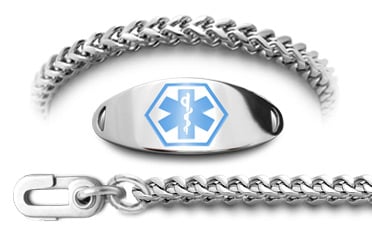
Includes bracelet and AirTag® holding-case as shown. AirTag® inside not included. Call 847-638-2223. Apple® iOS 14.5 or later.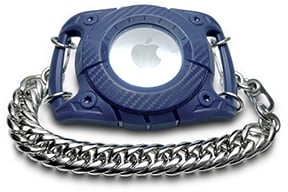
Our unremovable Dementia, Autism medical ID bracelets require 2 hands to open. Has difficult-to-remove clasps recommended by Alzheimer's organizations. Put on writing hand to make it extra hard to remove. See Beginners Guide
What to put on medical ID Plates to help first responders and doctors to do what's right when every second counts.
ALZ ID tag example:
ON BLOOD THIN
PACEMAKER-NO MRI
FORGETFUL
ICE0808080000
Autism ID tag example:
JASON JACKSON
AUTISM-NON VERBAL
DIABETES 1, NO SOY
ICE88800022220
Use less embarrassing terms for ID Tags in early stage ALZ-Dementia with softer wording such as:
1. FORGETFUL
2. MEMORY ISSUES
3. MEMORY IMPAIRED
4. MEMORY LOSS
5. ALZ (short for Alzheimer’s)
Use "ICE" (In Case of Emergency) cell phone numbers on Tags to get confused or lost loved ones back home safely.
See Abbreviations
List critical medical issues: Blood Thinners, "PACEMAKER", "AFIB", "DIABETES" and more. See Med Terms
Put bracelet on the “writing hand” so the more difficult-to-handle patients will find it harder to remove by themselves.
Advice for Caregivers
Introduce early so they understand why they need the bracelet, and they'll be less inclined to remove it later on.
Show them beautiful designs. It may help for them to participate and feel included in their own care. Doing everything for them can make them feel helpless.
Carefully measure so the fit is perfect and snug, but still comfortable to avod attempts to pull off bracelet. See How to Size
Avoid a loose fit because loose bracelets can be pulled off over the hand defeating the unremovable clasp system.
Get an early ALZ diagnosis
Getting the definitive diagnosis of Alzheimer’s early is important for both the patient and families because the cause of the disease is still fairly unknown. This makes it difficult to prevent Alzheimer’s in your adult life as well as making it difficult to treat especially if the disease is far along. Some benefits to be aware of for recognizing the disease early on are:
• A better chance of benefiting from treatment
• More time to plan for the future
• Lessened anxieties about unknown problems
• An opportunity for the patient to participate in decisions about care, transportation, living options, financial and legal matters
• Time to develop a relationship with doctors and care partners
• Benefit from care and support services, making it easier for them and their family to manage the disease.
Autism Defined
Autism is a disorder that manifests itself with a wide range of problems including poor social skills, repetitive behaviors and sometimes being nonverbal. Because there are so many different behaviors, the term “spectrum” is used. So it's now referred to as “autism spectrum disorder” or ASD.
CDC estimates 1 in 68 kids
in the USA have some form of ASD with varied intellectual problems. These children and the autism community often have other health issues associated with this disorder
Symptoms of Autism
People with autism show difficulty in social interactions such as avoiding eye contact, they're unresponsive to their name, they prefer to be alone, monotone speech, repetitive speech or actions, obsessive and compulsive behaviors. They often have difficulty dealing with unexpected changes to routines.
Sets Include Free ID tag and custom engraving
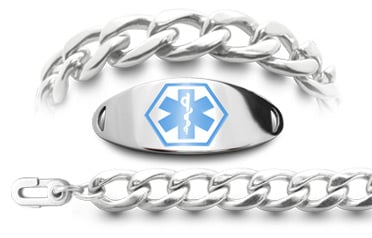
Includes Free tag and engraving. Virtually non-removable clasp and construction keeps loved ones safer than any ordinary medical bracelets.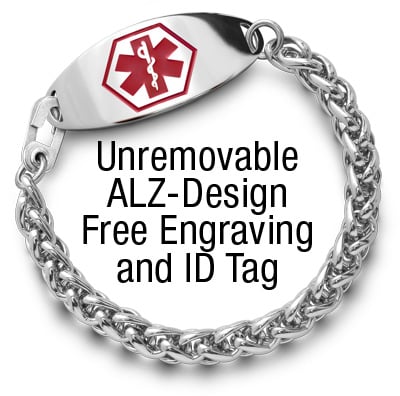
Unremovable GPS Conversions. Make your existing GPS or RFID watch style pendant into an unremovable bracelet. For tracking people with Alzheimer's, Dementia and Autism. Note: we do not provide the GPS device, we only convert your GPS if it's similar to the one shown here.
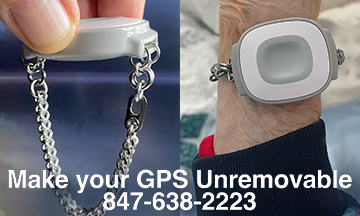
Understanding Alzheimer’s, Dementia and Memory Loss
Differences between dementia, Alzheimer’s and memory loss from aging can be hard to distinguish. All are notable problems for older adults although they often are used interchangeably and thus, inaccurately. There is a lot that is unknown about these problems, which is often why they're mixed up in everyday conversation.
Dementia
Dementia is the umbrella term that encompasses impairment of memory and/or thought processes enough to interfere with every day activity. It is a general term often used to describe a set of symptoms associated with a decline in memory processing meaning that the term “dementia” is not in and of itself an illness. Though, it can be caused by a number of underlying problems such as Blood Flow problems to the brain, Huntington’s disease or Parkinson’s disease.
Alzheimer’s
Alzheimer’s disease is a type of dementia that affects parts of the brain that specifically control thought, memory, and language. People with ALZ often show signs of confusion, personality/mood changes, memory loss, trouble communicating, and impaired visual recognition of words and objects. One major difference between general dementia and Alzheimer’s dementia is that Alzheimer’s is not reversible where some forms of dementia are reversible.
Autism Bracelet Tips
At an early age, introduce this bracelet so they get used to wearing one, and they'll be less inclined to remove it later on. Get one they'll like to wear. Something that sparkles, is shiny and has a captivating pattern—whatever is interesting. See Autism Sets
Measure carefully and follow our specific directions: How to Size. We need a skintight measurement as a baseline to which we add the correct comfort space. The object is for the bracelet to be comfortable, but snug so it can't be pulled off over the hand.
Unremovable clasp design requires 2 hands to open which prevents the Autism patient from easily removing the bracelet. Electronic bracelets and pendants can't match this safety feature.
Plan "B" Bracelet Design for Extreme Patients


When the Unremovable Clasp and Rings might be broken, we offer an alternative solution that eliminates the unremovable clasp entirely. Instead, an "All Jump-Ring Construction" uses only super heavy jump rings that can't be bent or broken. This is for patients that will not tolerate wearing a bracelet and have the strength and will to forcibly break the clasp/rings. This alternative solution requires a caregiver being capable of using 2 pliers to close the jump ring on the patients' wrist, or go to a jeweler. This is a permanent closure that can only be opened using pliers. It also requires using our heaviest bracelets such as Italiana 60862 and Catena Dura 62207. Call 847-638-2223 to discuss.
Non-removable ID with exclusive ALZ-AUT design
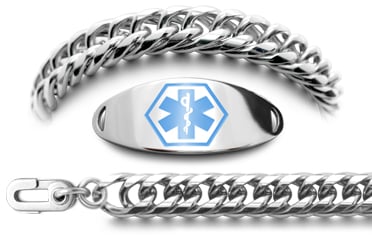
Featuring our unique "scissor-action sisterhook” clasp and a permanently attached ring to the ID tag keeps loved ones safer than ordinary lobster claw clasps. Experience has proven that this virtually unremovable design and construction is more effective to save the memory impaired so they're never lost.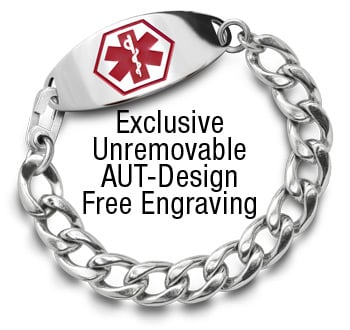
EMT's always look to the wrists first because along with the police, they are trained to always check the wrists first for a medical bracelet. So make sure it's attached firmly to the wrist with all critical medical information for proper care.
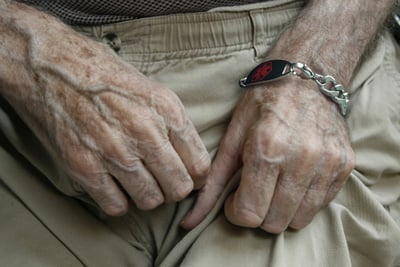
With only seconds to save a life, doctors and paramedics have no time for phone calls in a real "medical emergency". They must decide quickly what can and cannot be done on the spot. Only in "non-medical emergencies" will the police make calls.
Must be worn 24/7 and withstand water conditions such as chlorine or salt water. This means a stainless steel medical bracelet is your best choice. Avoid lightweight and delicate bracelet construction if not selecting from Alzheimer's or Autism pages. Please call if you are not sure.
If you are the “ICE” number recipient, make sure you have a Med info card that lists all medical issues for loved ones, so when called, you can provide useful help.
What you need for DNR: Most states will not accept a “DNR” from an ID tag without special paperwork or registration back-up. Check with local paramedics and hospitals for what is needed to honor a “Do Not Resuscitate” request.
5 stages of progression
1. Memory loss of recent events
2. Difficulty with problem-solving or complex tasks
3. Personality changes (withdrawn, irritable, quick to anger, lower attention span, etc.)
4. Difficulty expressing thoughts
5. Getting lost or misplacing things more often
Once they are past this stage, they will continue into Moderate and Severe Dementia due to Alzheimer’s. At this point they will:
• Become increasingly confused to the point of mistaking friends for family members (and vice versa)
• Wander in search of places that may feel more “right” or become lost
• Forget details of their personal life or fill in the blank areas with made up stories
• Need help with daily activities such as bathing or grooming
• Begin to undergo significant changes in personality to the point where they develop unfounded suspicions surrounding family members/friends
Once the later stages set in, it’s not uncommon for loved ones to lose their sense of self.
It's now even more crucial to have a medical bracelet in case they wander outside, get lost, and forget where they are or who they are with, or any other myriad of problems that can arise.
